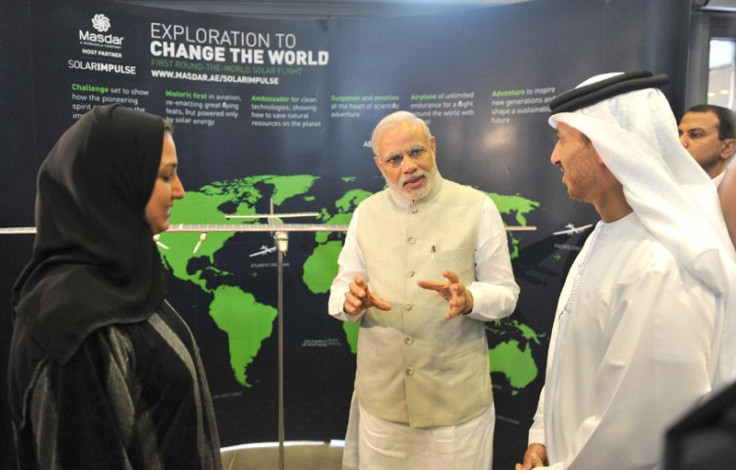Narendra Modi UAE Visit: Indian Prime Minister Says Country Has $1T Investment Potential

India has “an immediate potential” of one trillion dollars worth of investments, Indian Prime Minister Narendra Modi said Monday, on the second day of his maiden trip to the United Arab Emirates (UAE). Modi also promised to end the “indecisiveness and lethargy” of past Indian governments in attracting foreign investments.
Modi, who is the first Indian prime minister to visit the country in over three decades, was addressing international investors in Masdar City, an ongoing project that is aiming for zero emissions in Abu Dhabi. The UAE is made up of seven emirates, and the oil-rich region -- especially Dubai and Abu Dhabi -- has in recent years transformed itself into a global transport hub with a lively tourism sector.
“On one hand India is growing fast and on the other hand, the world is looking at Asia. But is Asia complete without UAE?,” Modi reportedly said during the meeting, adding that his government would work toward resolving “all outstanding issues” hampering economic ties between the two nations.
India and the UAE already enjoy strong trade ties. The Persian Gulf nation, home to approximately 2.6 million Indian expatriates, counts India as its largest import partner. Exports from India currently account for over 17 percent of the UAE's imports. In terms of total trade, the UAE is India’s third-largest partner, after the U.S. and China.
“There are 700 flights between India and the UAE, but it took 34 years for an Indian prime minister to visit,” Modi reportedly said. “I promise this will not happen again.”
A huge chunk of the Indian population in the UAE is currently employed in the nation’s sprawling construction industry. According to the Indian embassy in Abu Dhabi, approximately 65 percent of Indian expatriates in the UAE are employed in blue-collar jobs.
On Sunday, Modi visited a labor camp in Abu Dhabi, underscoring international concerns over the nation’s treatment of laborers. Human Rights Watch and Amnesty International have criticized the UAE for its treatment of migrant laborers, accusing many employers of continuing to withhold wages and confiscate passports.
“Despite significant and laudable labor law reforms and policies implemented by the development companies involved in the project, the lack of rigorous investigation, enforcement and sanction resulted in ongoing abuses of workers,” Human Rights Watch said, in a report released earlier this year.
On Monday evening, Modi is scheduled to address a gathering of nearly 50,000 Indians at a cricket stadium in Dubai.
“The Indian government is aware that the UAE will employ thousands of Indian workers to organize the World Expo 2020, but after the recent Qatar experience, the government wants to send a clear message that India will not allow rampant exploitation of its workers,” an unnamed Indian government official told Reuters. The official was referring to the controversy surrounding Qatar's alleged exploitation of workers employed to build out the oil-rich nation's infrastructure in preparation for the 2022 soccer World Cup.
© Copyright IBTimes 2024. All rights reserved.












